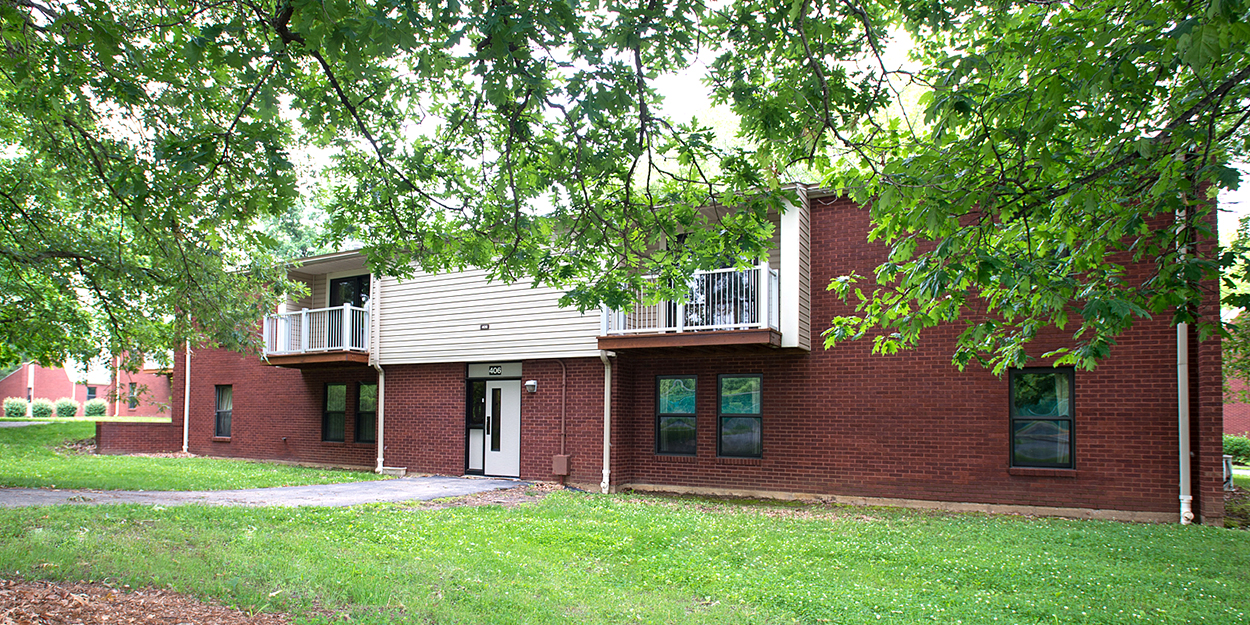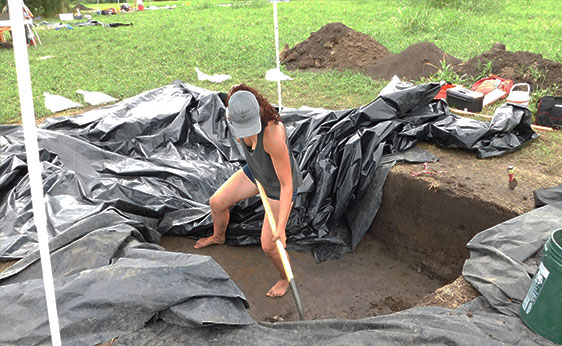Project Description
Overview
The Indigenous city of Cahokia, located in the American Bottom region of western Illinois, provides a unique context to investigate the processes of city formation and dissolution through examining people’s investment in place and place-making. Cahokia was a cultural and political zenith in the region between A.D. 1050-1350, characterized by three connected boroughs (St. Louis, East St. Louis, and Cahokia) and a series of outlying sites consisting of immigrants and local Terminal Late Woodland populations. This summer’s work is one part of a larger NSF-funded project examining how peripheral communities contributed to the construction, maintenance, and future dissolution of this medieval city.
This project developed from questions raised during IFR Field Schools in 2016 and 2017 in which we explored the ways in which landscape shaped the settlement history of one neighborhood in Downtown Cahokia. Here we expand this question to consider how engaged people living in neighborhoods on the physical periphery of the city were. Beginning with excavations at one such peripheral neighborhood to the west of Downtown Cahokia, we will consider how and by what means people actively chose to participate in the creation of this urban landscape. We will examine structural and artifactual evidence of people’s investment in the built environment (mounds, borrows, causeways, public buildings in or adjacent to the neighborhood), access to raw materials and completed objects, and participation in city-wide events that structured their daily activities, temporalities, and identities. We will consider size, shape, density, and orientation of structures to identify when this neighborhood was occupied and for how long. This evidence will be compared to what we know about neighborhoods already excavated in the core of two major precincts: East St. Louis and Downtown Cahokia, to evaluate whether peripheral neighborhood occupants are engaging with Cahokian practices and ideologies at the same or similar levels as people in the core civic-ceremonial areas of the city. In the bigger picture, we will consider whether level of investment coincides with longevity of peripheral neighborhoods (and thus their contribution to the rise and decline of the city).
| Course Details | |
|---|---|
| Course Dates | June 2-July 6, 2024 |
| Course Type | Field Archaeology |
| Instructors | Dr. Sarah Baires & Dr. Melissa Baltus |
| Credits* | 8 semester (12 quarter) |
| Apply By | April 1 |
| Fees Due By | Summer 1 (May 1) |
| Program Fees | |
|---|---|
| Tuition | $4,600 |
| Transcript Fee* | $300 |
| Health & Evacuation Insurance | N/A |
| Room (Meals not included) | $1,450 |
| TOTAL: | $6,350 |
Applications accepted on a rolling basis until program fills or final deadline above.
Instructors
The directors welcome emails and inquiries about the research elements of this project. More general information (tuition, health insurance, and payment schedule) can be found under the ‘Students’ tab above. Any further questions may be addressed to IFR staff. Additional details about research, course schedule, travel, accommodation, and safety can be found on the syllabus. Contacting the directors or the IFR office is encouraged and appreciated. It may help you determine if this field school is a good fit for you.
Testimonials
This is a revised IFR field school. No student testimonials are available at this time.
Payment & Student Fees
Application Fee: There is a $45 fee to submit an online application.
Deposit Payment: A nonrefundable $500 deposit is due within 3 weeks of program acceptance in order to secure your place. The remainder of your program fees are due by the deadline indicated under “Course Details”.
*Transcript Fee & Academic Credit Opt Out: If you wish to participate in an IFR field school without earning academic credits, you will not be charged a transcript fee.
For more information about payment, fees, and policies, please see details under our Payment & Finances and Withdrawal and Cancellation Policy pages.
Accommodations
Students will be housed in the dorms at Southern Illinois University Edwardsville. Housing consists of two students per bedroom in two-bedroom furnished apartments (4 people per apartment). One additional room will be kept for isolation purposes should it become necessary.
- Furnishings include couch, 2 chairs, end tables, kitchen table and 4 chairs. Each bedroom includes 2 XL twin beds, 2 dressers, and 2 desks. Kitchen includes oven/stove and refrigerator. Apartments have access to Wireless internet and data jacks. A/C, heat, water, sewage utilities are included.
- Participants are required to provide linens, towels, small appliances (if desired), etc. University Housing will provide a shower curtain.
- Students will be required to keep their spaces clean, including cleaning and disinfection of high-traffic touch areas and common spaces (e.g., bathroom, kitchen, etc.). Cleaning supplies will be provided by project supervisors.
- Each residence hall has a laundry room with both washers and dryers. The cost is $1.25/load for the washing machine and $1.25/load for the dryer. Students can pay using quarters; laundry detergent pods can be used.
Meals will not be provided for students but a number of meal options are available. Each apartment has a kitchen. A weekly shopping trip will be organized so students can purchase the food and ingredients they would need for their meals and snacks for the week. Students will be responsible for making and packing their own lunches which will be eaten in the field. Dining options at SIUE will include a variety of options in the Student Union or meals can be purchased at the dining hall. Students are also welcome to use the kitchens in their apartments to cook their own dinners. Students are required to keep their kitchen spaces clean for both food safety purposes as well as for appropriate use of communal space.


Travel Info
Natural disasters, political changes, weather conditions and various other factors may force the cancellation or alteration of a field school. IFR recommends students only purchase airline tickets that are fully refundable and consider travel insurance in case a program or travel plans must change for any reason.
General information for this program is below, but keep in mind we will discuss any updated travel information and regulations during the required program orientation, which could affect travel plans.
Students arriving by air into the St. Louis Lambert Airport (STL) should take the Metro (red or blue line) to the St. Louis MetroLink Fairview Heights station. Project staff members will meet these students on June 2 at 4 pm at the station. If you are driving please arrive at the apartment on June 2 by 4 pm. Students are encouraged to drive if local to the region. Project directors and/or staff will not provide access to a vehicle for weekends, though there is a local bus service.
- Students and staff will travel from housing location to the field site daily. The van will leave from SIUE Cougar Village at 7:00 am sharp and return by 4:30 pm. This is a 15 passenger van; should COVID-19 circumstances compel us to reduce the number of occupants, two waves of transport will occur (one leaving at the regular time, the other leaving at 8:00 am and returning at 5:30).
VISA REQUIREMENTS
Citizens not from the USA are asked to check the embassy website page at their home country for specific visa requirements.
Student Safety
The IFR primary concern is with education. Traveling and conducting field research involve risk. Students interested in participating in IFR programs must weigh whether the potential risk is worth the value of education provided. While risk is inherent in everything we do, we do not take risk lightly. The IFR engages in intensive review of each field school location prior to approval. Once a program is accepted, the IFR reviews each program annually to make sure it complies with all our standards and policies, including student safety.
Students attending IFR international programs are covered by a comprehensive Health Insurance policy that includes physical illness or injury, mental or chronic conditions. No deductible and 100% of costs are covered up to $250,000. In addition, we provide Political and Natural Disaster Evacuation policy, which allow us to remove students from field school location if local conditions change. Our field school directors are scholars that know field school locations and cultures well and are plugged in into local communities and state institution structures.
Students attending IFR domestic programs (within the US) must have their own health insurance and provide proof upon enrollment. IFR field school directors are familiar with local authorities and if in need of evacuation, local emergency services and/or law enforcement will be notified and activated.
The IFR has strong, explicit and robust policy towards discrimination and harassment in the field. If students feel they cannot discuss personal safety issues with field school staff, the IFR operates an emergency hotline where students may contact IFR personnel directly.
Call (877-839-4374) or email (info@ifrglobal.org) if you have questions about the safety of any particular program.















